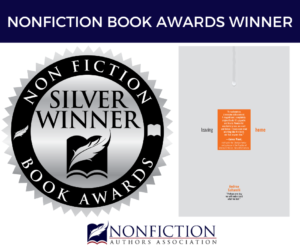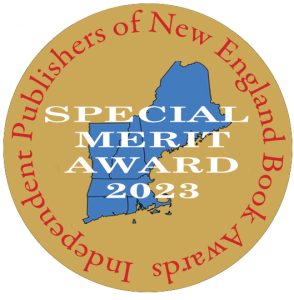$30.00
Leaving Home is the quest for sanity by a man devastated by civilization’s 10,000-year-old assault on this sentient planet and its shimmering offspring—us. As if civilization were an organic force, an evolutionary driver of its own. The umbilical cord which for hundreds of thousands of years had attached our hunter-gatherer ancestors to the earth’s Common Sense (Thoreau) is severed.
Our dilemma, argues Saltarelli (following the work of the late Paul Shepard), is we cannot escape our ancestry; we are hardwired to think and behave like our Pleistocene parents. (Carl Jung, using different technical terms, had potent thoughts on the subject, as did Aldous Huxley.)
With this, Saltarelli launches into a fascinating, brilliant, beautifully-written analysis of hunter-gatherer (paleolithic) societies and their thought-world, using California Indians and Kalahari Bushmen as case studies. A thought-world founded foursquare on the Great Code of the gift: the gift of animal flesh, the gift of plants, the gift of mutual nurturing within the group.
And then the fall from grace. No, not the grace of a cantankerous sky god who, significantly, is male. The fall is turning of one’s back on the hunter-gatherer principle of the gift (based on woman and her powers) to pursue, now, relentless, systematic agriculture. The ancient gift has been replaced by control. In this brave new grain-fed, stockyard world, mankind is “master and possessor of nature” (Descartes). Here Saltarelli dives into the Gilgamesh story, with its Chosen People and sky gods fixated on good and evil, born out of the climatic austerities of the Holocene; a narrative perpetuating its unhinged mindset by robbing its precious children, generation after generation, of their birthright of grace—the ineradicable natural law that we are nurtured by the gifts of the earth and our non-human animal brethren (totemism), not by human domination and ingenuity.
This is Saltarelli’s cri de coeur. This is why he wrote the book. And this—call it the Tragedy of the Garden—is the immense inchoate sorrow besetting us all. Read Dylan Thomas’s “Fern Hill.” With this book Saltarelli strives to restore not childhood; it is the natural law of the gift he craves. So do we all. Which is why readers— witness The New Yorker’s James Wood and the University of Aberdeen’s Tim Ingold—are so deeply moved by Saltarelli’s courageous story. Call it Saltarelli’s Autobiography of Us All.
In a wistful closing chapter Saltarelli brings us full circle to the grace of Ishi, the “wild man” (San Francisco papers called him: 1911) who materialized out of the volcanic mists of Mt. Lassen and surrendered, for some obscure reason, to civilization. A man who never committed the sin of the Great Forgetting. A man within whose breast still beat the earth’s dark millennial heart (Eiseley).
Andrew Saltarelli’s Joycean tour de force, Leaving Home, is a meditation on our hunter-gatherer predecessors and what we now must learn from them. He calls his genre-defying book a “poetical argument.” It is more—a journey both back in time and inward to our core, to the place of tranquility and laughter, to kinship round the fire.
He begins by exploring the Ohlone, Chumash, and Kalahari before opening onto a broad plain, where he touches on ten thousand things—ritual, the beginnings of agriculture, the submergence of hunter-gatherer consciousness, grammar, anthropomorphism, warfare, redness, dreaming, nurture, dogs, grandmothers, property, initiation, climate change, menstruation, Kant, otherness, hunting, farming, Hebrew prophets, food storage, is there a normative ontogeny, arrowheads, grief, metaphor, why porcupines should be killed last—all of these dots connected loosely and sometimes, it seems, magically.
All attempts to prune this long argument back have risked turning it into the thing from which it is trying to awaken the reader—the reduced field, narrowed vision, diminished sensory awareness, and quashed joy of the overcivilized human. Several years ago I became hooked on reading Karl Ove Knausgaard’s 3500-page, six-volume work of autofiction, My Struggle. Like me, many reported they couldn’t get enough of it. Reviewers noted the author’s inability to leave anything out, his need for “inexhaustibility.” The same may be said of Leaving Home. Its length reflects the plenitude of the world we are on the verge of losing.
For Saltarelli the wounds of civilization are personal as well as historical. That is why the book’s subjective component is an important, not an accidental or superfluous, element. Saltarelli’s liminal relationship to our civilization also makes his critiques of Thoreau, Henry James, Wendell Berry, John Muir, and anyone else whose work he examines, especially fascinating; his view of them is far outside the frame in which we normally view cultural and literary icons. It’s because of where he’s not standing that he has something important to say about the current disintegration and what might come after it. (Reading this manuscript and seeing human existence through the hunter-gatherer lens reminded me of the thrill of seeing Christianity for the first time through the eyes of Ludwig Feuerbach.)
What might we as a species become when this system has run its course, when capitalism has exhausted its welcome? What is “the way of the human being,” as Calvin Luther Martin puts it? What other ways are there to live than the ones that brought us here? That is the terrain this remarkable book explores.
—Edward Levy, poet and editor of numerous award-winning books, whose clients include Princeton University Press, Doubleday, Random House, and SUNY Press.
Dimensions: [10″ high x 7″ wide x 1.5″ thick] [25.4 cm high x 17.9 cm wide x 3.8 cm thick]
Weight: [3 lbs, 0.5 oz] [48.5 oz] [1376 gms]
ISBN: 978-0-9841827-5-6
Publication Date: 2023
Click here to read the front matter, Table of Contents, a Note, chapter 1 (First Light), and chapter 8 (Faces by the Fire).
I grew up in the north Chicago suburbs: very happy childhood. A fine athlete in high school — tennis, baseball, soccer — and spent my nights reading Kafka, Joyce, Mann, Forster, Bellow, Shakespeare, Keats, Frost, etc.
I wanted to be President in 3rd grade, but by 5th grade I knew I was to be a writer.
I attended the University of Michigan and the University of Virginia: briefly. Never went to class much, just enough to not fail out. Then dropped out.
I didn’t like college. Always been an auto-didact. It seemed to me university classes were the place literature went to die. I was also a little intense: probably alienated my peers. Became isolated. Dropped out due to a breakdown, frankly. Virginia Woolf talked about hearing birds sing in Greek; alas, no such luck.
My best friend lived in Boulder, Colorado and two years after moving back home, I felt better and drove out and joined him. The mountains were a revelation. A few months later I met my ex-wife. We were together for 12 years. A very adventurous time! We bopped around the West, moving every few years. Portland and Ashland Oregon, Hamilton and Stevensville in Montana, other places. We woofed — a work-trade on small organic farms — in the North Carolina Blue Ridge and Tennessee and Northern California. I wrote shitty novels and worked odd jobs: dry clean delivery driver, janitor at a homeless shelter, weeded for a “living roofs” company; that sort of thing.
The three years in Montana were my enchanted time. Started writing “Leaving Home” there. After working I biked to the Bitterroots and went searching for bears. I loved Montana. I loved so much wild land. Carolyn and I got married at a courthouse.
My wife started calling me Hopes-to-see-Bear.
We lived frugally.
Carolyn was a hospice Certified Nursing Assistant. We moved to Denver so she could take a one-year accelerated nursing program. I got a job in the produce department of a supermarket and spent another year obsessing over “Leaving Home.” I suppose it took four years, five counting research. Finished the ms. in Denver while my wife was working nights in a cardiac unit. Then she became a hospice nurse, miraculously transforming a violent and terrifying childhood into compassion and tenderness for the dying.
I tried and failed to get “Leaving Home” published, had a naive fantasy about making a real income, moving to a cottage near wilderness and adopting a child.
Things fell apart: we got divorced. I roamed. St Paul, Madison, Mendocino. Worked, respectively, at a residential home for the mentally ill, a UPS warehouse, a farm filled with pseudo-liberal Berkeley hippies who thought they were saving the world. Returned to my parents’ home.
Currently living in my little sister’s old bedroom and working on a fictional tetralogy: “Leaving Home” recast as adventure fiction.
In sum: I hiked in mountains a lot, read and wrote a lot, and just went my own way, burning with a vision.
A masterpiece. A massive achievement. A magnificent, completely original book. It’s gigantic and lovely. Wonderful wonderful prose, so exact and lyrical. I have never read anything like this book, nor has anyone else.
James Wood, staff writer for The New Yorker and Professor of the Practice of Literary Criticism, Harvard University
The kind of book that the world desperately needs.
Timothy Ingold, Chair in Social Anthropology, University of Aberdeen (UK)
A work of immense beauty. Salvific.
Christopher Vecsey, Henry Emerson Fosdick Prof. of the Humanities & Native American Studies & Religion, Colgate University, New York
A book of prodigious scope and intelligence.
Calvin Luther Martin, author of The Way of the Human Being and retired Rutgers University professor of history
May 26, 2023, we were notified by the Nonfiction Authors Association that Leaving Home won a Silver Award in Anthropology.


Leaving Home subsequently won two additional awards in 2023.
A “Special Merit Award” from the Independent Publishers of New England:

And a “Finalist Award” from American Bookfest (AmericanBookfest.com):
